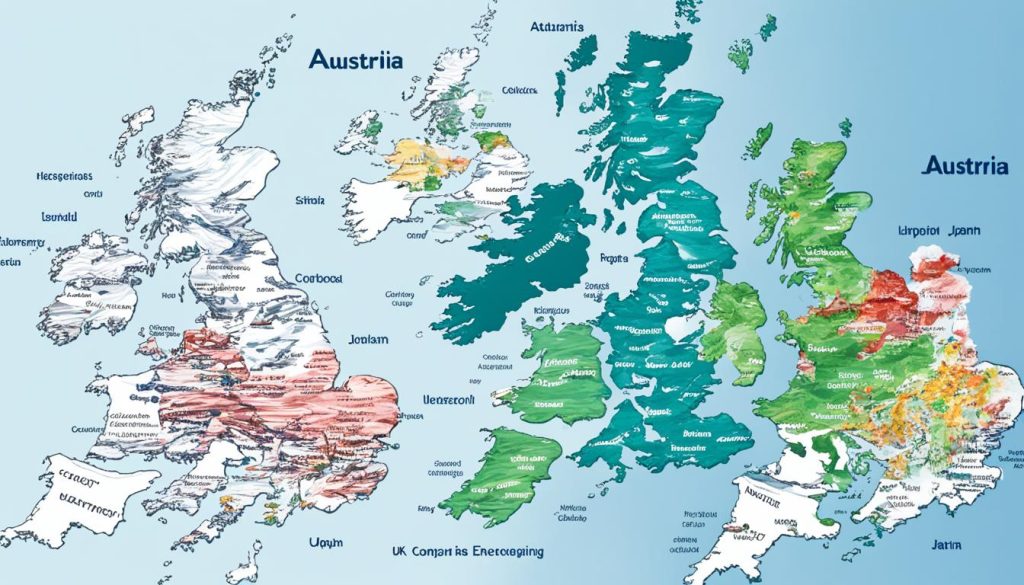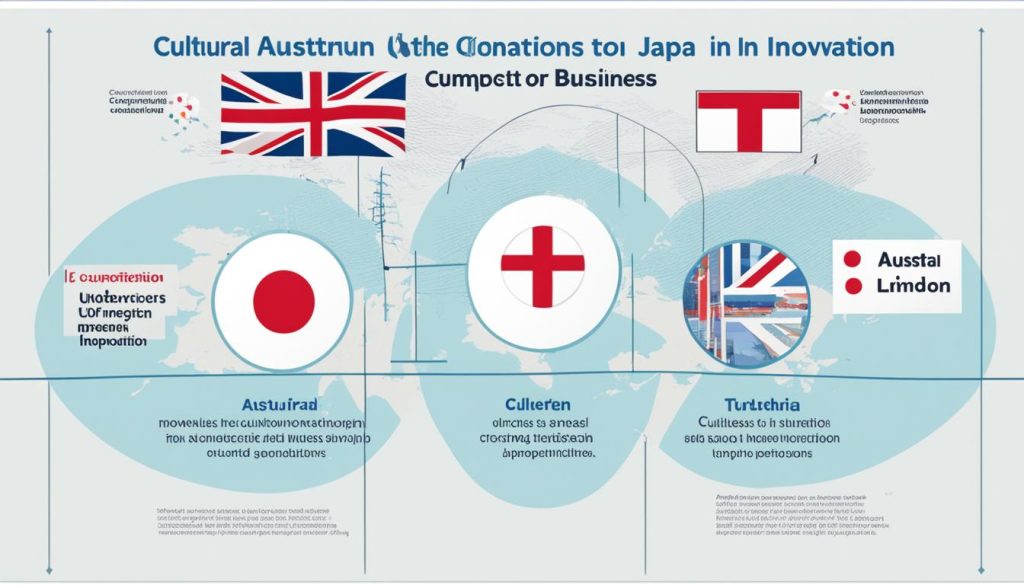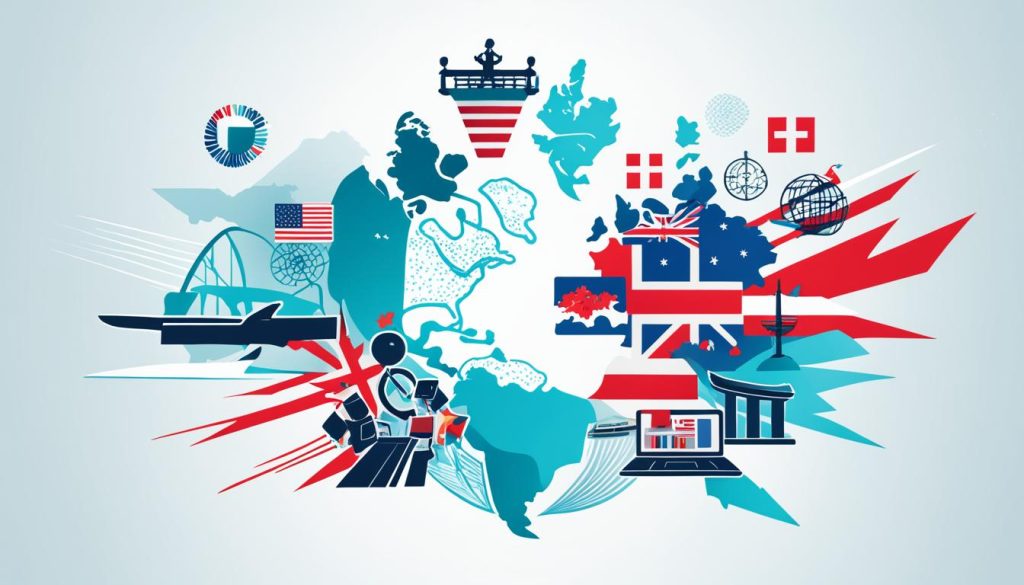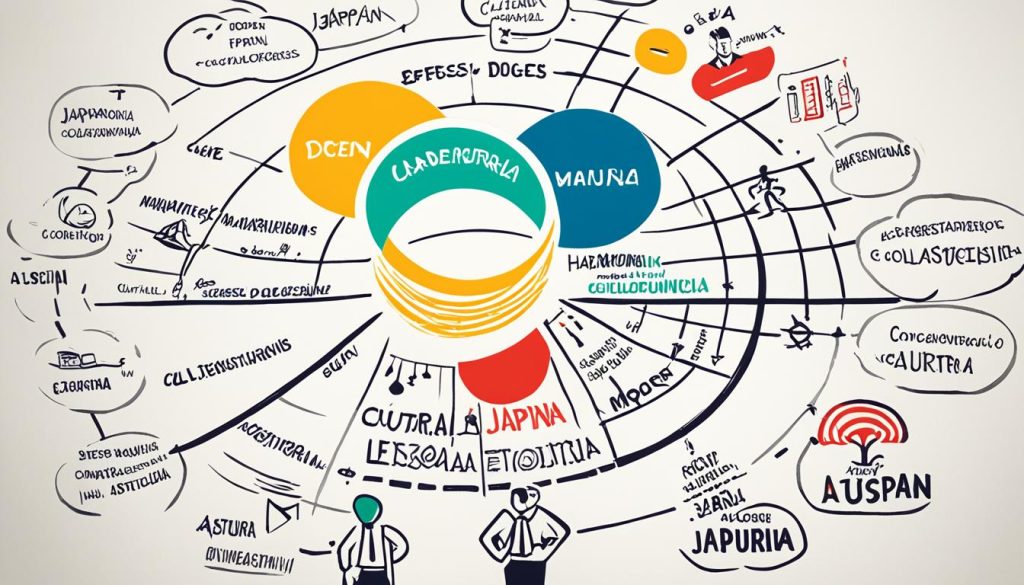When businesses eye international growth and teamwork, knowing the culture is key. Nations like Austria, the UK, and Japan show how business differs worldwide. Each one has its own mix of history, innovation, and values shaping how work is done.
Austria mixes old-world charm with a fresh perspective, rooted in its European heritage. The UK shines in global trade and finance, showing strength and flexibility. Japan stands out with its blend of tradition and modern efficiency, where respect and detail guide every deal.
Exploring these countries’ markets isn’t simple. It calls for a deep understanding of their unique business ways. This means seeing how traditions and economics play together.
The Role of Business Culture Complexity in International Markets
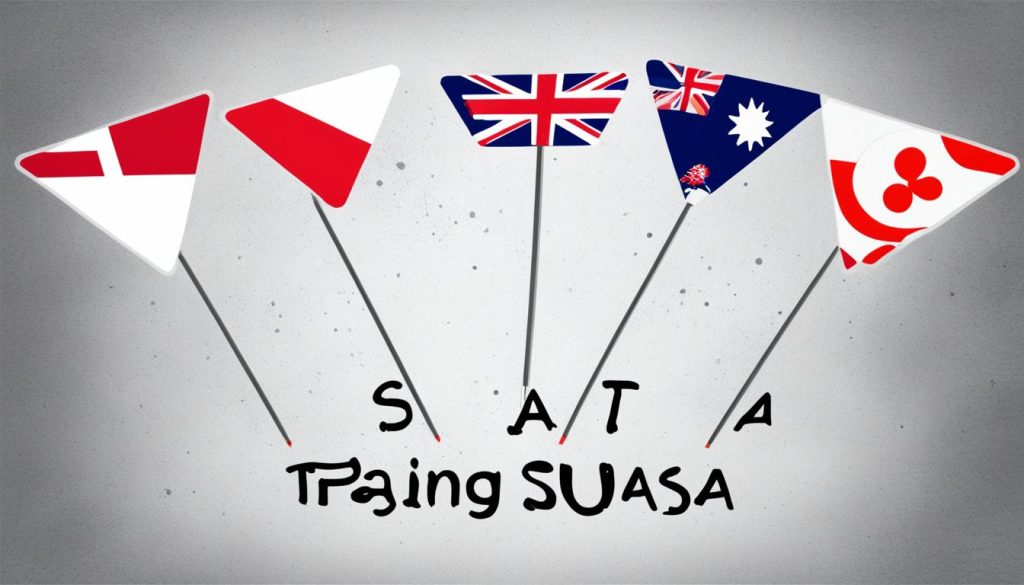
Globalisation makes the world’s markets more connected. But, doing business internationally shows its tricky side. The Business Culture Complexity Index (BCCI) helps tackle these challenges. It’s vital for companies entering or growing in foreign markets. This is because it looks at how complex a country’s business culture is.
Understanding the Business Culture Complexity Index (BCCI)
The BCCI measures how easy or hard it is to do business in various countries. It uses data from social, economic, and cultural sources to provide a detailed analysis. This information helps investors and entrepreneurs make smart choices. They learn about potential challenges and benefits of different cultures for their businesses.
Comparative Analysis of BCCI in Austria, UK, and Japan
In 2022’s BCCI League Table, the UK stood out. It showed a business culture with less complexity than others. This means it’s easier to do business there, with fewer cultural obstacles. Investors and businesses can use this data to understand the markets in Austria, the UK, or Japan better. Knowing where these countries stand helps companies plan their approach according to each nation’s business culture complexity.
Distinct Economic Profiles of Austria, UK, and Japan
World economies are unique due to each country’s financial and tech strengths. Austria is known for its solid economy. The UK is a financial leader, staying strong even after Brexit. Japan’s tech advancements push its export-led growth. These nations show how they handle business and commerce uniquely.
Austria: A Compact Economic Force in Central Europe
Austria, rich in culture, thrives economically due to its central European location. This position boosts trade and investments. It makes Austria a key player in the EU’s economy.
The United Kingdom: An International Financial Hub Post-Brexit
The UK has been a major financial and commerce center for a long time. Despite Brexit changes, it keeps its global finance status. The UK’s financial sector adapts well, attracting firms and investors worldwide.
Japan: Technological Prowess and Export-Driven Economy
Japan is celebrated for its technology and innovation culture. Its economy leans heavily on exporting tech goods and cars. This has established Japan as a tech leader worldwide.
Contrasting Cultural Dimensions Across Austria, UK, and Japan
Businesses are going global. It’s key to grasp how culture impacts business practices worldwide. A look at Austria, the UK, and Japan shows how societal norms and traditions shape business. These cultural traits influence leadership, negotiations, and how companies are run, deeply and subtly.
-
In Austria, businesses prize structure and order. This preference leads to organized and careful business methods. While hierarchies control corporate life, there’s still room for individual ideas and contributions.
-
The UK mixes formal and casual in business, reflecting its diverse people. Here, everyone’s encouraged to speak up equally. This affects how people negotiate and lead.
-
Japan values group unity and agreement in business. This results in teamwork and collective choices. It also brings a strong sense of community and respect in the workplace.
Understanding cultural values helps companies succeed in international markets. Being good at cross-cultural analysis is essential for global business growth. Knowing and respecting foreign cultural traits is polite and smart for working together across borders.
Business Etiquette and Practices: A Tripartite Overview
Achieving success in international business means respecting local ways and following global rules. When starting partnerships in Vienna, making deals in Tokyo, or going to meetings in London, knowing business manners can lead to worldwide success.
In Europe’s heart, Austrian business manners blend formality with friendliness. Austrians see being on time as showing respect. A strong handshake and looking someone in the eye are key in professional meetings. It’s also crucial to use titles properly to show you understand business norms.
- Addressing colleagues with their professional titles and last names is customary in Austrian corporate practice.
- Gift-giving reflects thoughtfulness and is considered a part of international etiquette.
- Decision-making could be a slow process, with a preference for thoroughness over speed.
In the UK, business balances tradition and the modern world. The British communicate in a low-key way. Their politeness might hide their real feelings during talks.
- Minimise potential misunderstandings by assessing non-verbal cues within corporate practices.
- Interactions start with light conversation, but avoid topics that may be considered too personal or controversial.
- Email correspondence should be concise and devoid of exaggeration to align with British business conduct.
Japanese business focuses on social harmony and respect. It’s important to build relationships before discussing business. Knowing how to bow correctly is a key part of Japanese business manners.
- Exchanging business cards (meishi) requires a formal ritual that respects the individual’s standing within the company.
- International etiquette within Japanese business culture emphasises teamwork and collective decision-making.
- Silence is meaningful, providing time for consideration, and should not be mistaken for disinterest.
Every culture has its unique business manners. Understanding these details is crucial when dealing with international relations. Regardless of the place, respecting traditional corporate practices and mastering global etiquette is key for business growth and success.
Innovation and Competitive Advantage in Varied Cultural Contexts
In the world of business, innovation is key to staying ahead. Countries like Austria, the United Kingdom, and Japan have found unique ways to innovate based on their cultures. This innovation drives their strategies and helps them lead in various industries. Next, we’ll see how these countries use innovation to get ahead, all while respecting their cultural backgrounds.
Fostering Innovation: Austria’s Approach
Austria combines its rich history with new trends to spark innovation. The country supports teamwork among schools, industries, and the government. This support creates a strong environment for bringing ideas to life. Austria also invests in research and development, showing its dedication to growth and a competitive edge.
Adaptability and Creativity in the United Kingdom
The United Kingdom is known for being creative and adaptable. UK businesses are open to new ideas and invest in the latest research. This openness, combined with creativity, makes a business strategy that stands out. It helps the UK keep a strong position worldwide.
Japan’s Unique Blend of Tradition and Innovation
Japan offers a special mix of tradition and new technology. This mix fosters innovation that stays true to Japanese values like discipline and unity. Japanese companies use their culture to gain an advantage. Their focus is on new technology and improving continuously to better serve customers.
At the end, innovation mixed with cultural values helps these countries lead globally. It’s about blending the past with the present and balancing local traditions with global trends. This balance gives these nations their unique edge in the world market.
Work-Life Balance and Employee Wellbeing in Different Cultures
The idea of work-life balance and employee wellbeing shows how much a culture values healthy work habits. This idea looks different in Austria, the United Kingdom, and Japan. Every country has its way of blending work happiness with personal life through unique cultural perspectives and policies.
- Austrians enjoy a balance between work and life thanks to strong laws. They have generous leave policies for vital rest and better work results.
- Flexible hours and remote work are getting popular in the UK. This reflects an evolving understanding of wellbeing to enhance employee performance over time.
- Japanese culture used to mean long work hours. But, there’s a new focus on balancing hard work with personal wellbeing.
- In Austria, health programs are key in businesses, aiming to boost worker happiness.
- UK firms are now focusing on mental and physical health. They see this as key to their team’s health.
- Japan’s ‘Premium Fridays’ let employees leave early, showing a new way to think about work and life balance.
In Austria, the UK, and Japan, the drive for work-life harmony and looking after workers goes beyond just business. These examples show how deeply each culture values these ideas. They point towards different ways to create a happier, more balanced work-life.
Corporate Governance and its Cultural Implications
In the modern business world, corporate governance is more than basic management. It now covers cultural aspects and follows specific rules. These parts are key to setting business values in various countries. They show us how companies operate worldwide.
Austrian Corporate Culture: A Synthesis of Tradition and Modernity
Austria has a unique way of handling corporate governance. It mixes old traditions with new ideas. Austrian businesses keep a balance between ethical practices and modern strategies. This method goes beyond just following rules. It ensures firms respect both old and new business values.
Regulatory Frameworks in the United Kingdom and Their Cultural Underpinnings
The UK’s corporate governance has evolved, especially after Brexit. UK businesses now critically review their governance plans. This shift is deeply influenced by British cultural standards. It has created a corporate world that values tradition, change, and openness.
Japanese Corporate Governance: Balancing Confucian Values and Modern Demands
In Japan, corporate governance is closely linked to Confucian values. Japanese companies find a middle ground between these ancient values and today’s needs. This balance forms a governance model with a unique Japanese touch. It allows Japanese firms to stay true to their roots while embracing modern governance ways.
Digital Transformation and Cultural Adaptability
In the heart of Europe, Austria is blending its rich history with the digital age’s needs. This mix of cultural adaptability and tech progress keeps Austria competitive. In today’s world, embracing innovation is essential for growth.
The United Kingdom is redefining itself after Brexit with a versatile approach to cultural adaptability. Its digital transformation shows agility and forward-thinking. The UK adapts well to global market shifts, thanks to its innovative spirit.
Embracing Digital Innovations in Austria
Austria is dedicated to digital transformation, evident in its modern digital infrastructure. This shift is changing traditional Austrian businesses, making room for tech advances and economic growth. Austria’s jump into the digital world keeps it ahead globally.
The United Kingdom’s Cultural Receptiveness to Digital Change
The UK’s long history of creativity helps it embrace new technologies. Its businesses are open to digital changes, easing into the digital age. This change is widely accepted, making the UK a hub for innovation.
Japan’s Technocultural Evolution and Business Practices
Japan’s mix of tradition and technology is unique. Its technocultural evolution shows a commitment to always getting better. Japan leads in digital innovation, with its focus on quality and precision. This keeps Japan at the forefront of technology.
Leadership Styles and Decision-Making Processes
Leadership in organisations varies as much as cultures around the world. Leadership styles reflect not just personal choice but also the values and norms of society. So, in countries like Austria, the UK, and Japan, management and decision-making vary due to cultural influences.
In Austria, you’ll find a mix of management approaches. They combine teamwork with authoritative structures. This mix allows for input from everyone but keeps clear leadership. It’s a way to meet modern business challenges with flexibility.
The UK’s leadership style is about including everyone and being flexible. The approach welcomes feedback from employees. It encourages them to take part in making decisions. This reflects a culture that values empowering people and breaking down strict corporate rules.
Japan values harmony and respect in its leadership and decision-making. It prefers to make decisions by reaching consensus. This method might take longer, but it leads to decisions that everyone supports. It’s a unique style that fits well with Japan’s cultural views.
- Collaborative and Hierarchical: Austrian leadership demonstrates a synthesis of collective input with established hierarchies.
- Inclusive and Adaptive: The inclusive nature of British leadership styles creates a fluid and engaging management environment.
- Consensus-based: In Japan, the emphasis on unanimity within decision-making underscores a deeply rooted cultural ethos.
Understanding these leadership styles helps us see how decision-making differs globally. Each country’s methods shed light on their leadership philosophies. They show why tailored leadership is vital in international business.
Compare Business and culture between Austria, United Kingdom and Japan
In this part, we explore the link between business ways and cultural norms in Austria, the UK, and Japan. We’ll see how each country’s business habits are based on its culture. This helps us understand global trade and the role of culture in shaping business actions.
Exploring Synergies and Disparities in Business Approaches
Different business styles in each country show how culture influences international work. Austria is known for its precise quality standards, while the UK values innovation. Japan focuses on detailed processes and teamwork. These differences can be tricky but they also bring new chances for businesses going global.
Cultural Roots of Business Etiquette and Negotiation Tactics
Austria, the UK, and Japan have unique cultural views that affect how they do business. In Austria, people like to be straightforward yet formal. The UK prefers subtle and polite talks. Japan values respect and non-verbal communication. Knowing these approaches is key for smooth and respectful dealings.
- Business comparison highlights the need for cultural awareness in international relations.
- Cultural synergy enhances the potential for innovative collaborations.
- Negotiation tactics rooted in cultural understanding lead to better business outcomes.
- A mindful business approach is essential in respecting international partners’ cultural nuances.
Understanding these points helps businesses work well in international settings. It makes room for success when different practices and values come together.
Economic Sustainability and Culture-Driven Policies
Exploring sustainable growth shows us how culture and green tactics shape economies in Austria, the UK, and Japan. These countries balance wealth and caring for the environment. They are known for their green business methods.
Austria’s Eco-Conscious Economic Strategies
Austria is known for its beautiful Alps and caring for nature. It focuses on renewable energy, good recycling, and eco-friendly transport. These approaches show Austria’s dedication to protecting our planet.
Sustainability as a Competitive Edge in British Business
The UK sees green efforts as key to doing well in business globally. It’s leading in clean tech and responsible business behaviors. British companies gain from being green through better brand recognition and trust from buyers.
Harmonising Economic Growth and Cultural Preservation in Japan
Japan mixes new tech with old traditions well. It values eco-friendly business while keeping its culture alive. Japanese firms are known for being efficient and innovative. They’re helping Japan move towards a greener future.
These countries show the importance of green policies in business. Their efforts in eco-friendly strategies make them leaders. They motivate others worldwide to follow in their footsteps.
Trade Relations and International Partnerships
The world of trade is like a complex piece of art made of many relationships and partnerships. The United Kingdom has a rich history of trading across the globe. Its strong economic ties have lasted through many changes. Austria uses its location well to help connect European countries. Japan is known for its high-tech goods and vast network of business partners.
Countries have their own ways of building and keeping international partnerships. They pay close attention to cultural differences and economic needs. This understanding helps them to fit their strategies into the world’s trade scene.
- Assessment of Economic Collaboration Initiatives
- Comparative Analysis of Bilateral and Multilateral Trade Agreements
- Case Studies on Joint International Ventures and Alliances
The United Kingdom, Austria, and Japan have adapted to changes in the world economy. They aim to get the most out of working together, while respecting their unique business traditions. This ability to change helps maintain strong trade relations and international partnerships, boosting global business.
- Exploring the Impact of Cultural Understanding on Trade Negotiations
- Identifying Trends in International Supply Chain Management
- Evaluating the Role of Technology in Fostering Economic Ties
In today’s world, building strong trade relations is key to finding success. Doing this well is like creating a masterpiece. It takes skill, insight, and an openness to the complexities of global markets. This is what makes countries such as the United Kingdom, Austria, and Japan stand out. They lead the way in shaping the future of international trade.
Talent Management and Cultural Diversity
In today’s world, cultural lines are fading. Managing talent in a diverse team is crucial for countries like Austria, the UK, and Japan. They know that managing talent well with people from various cultures is a key to success. This ability lets them be strong competitors globally.
Integrating Diverse Workforces in Austria
Austria sees the value in having a diverse team. It aims to make everyone feel included. This helps bring new ideas and keeps the business scene lively. It’s important for Austria as it grows its reach around the world.
Cultural Diversity as a Strategic Advantage in the UK
The UK is a blend of many cultures. It uses this mix to stand out in business. British firms are all about diversity. They look for people with different backgrounds to make their teams better. This mix of views sparks creativity and new ideas across industries.
Japan’s Approach to Multicultural Talent and Globalisation
Japan values its culture but faces challenges in adding outside talent. However, it’s starting to see the benefits of a diverse team for staying ahead globally. Japan is mixing global talent strategies with its traditions. This creates a space where old meets new beautifully.
- Cultivating an inclusive culture through policies and practices that recognise and celebrate cultural diversity.
- Prioritising talent development by affording opportunities for career growth and personal development across cultural lines.
- Encouraging cultural sensitivity and awareness, fostering respect and collaboration within a multinational workforce.
As firms grow and enter new markets, managing a diverse team is key. Diversity brings innovation and a wealth of ideas. These ideas are what drive the future of global business.
Conclusion
When we look at the business customs of Austria, the United Kingdom, and Japan, we see they are all unique. They each have their own way of doing things that affect how they handle business. Understanding these differences is key for anyone looking to work globally. Taking a closer look at Austria’s balance of old and new, the UK’s adaptability after Brexit, and Japan’s push for tech shows why knowing the market is important.
In comparing Austria, the UK, and Japan, we see how culture impacts business. This look at their different approaches shows the power of cultural understanding. Recognizing the important role of culture helps businesses navigate through each country’s economic and cultural scenes. It’s not just about knowing facts but using this knowledge to build strong partnerships and grow.
This study offers valuable insights for businesses aiming to enter or expand in these countries. It makes the case for the importance of cultural sensitivity. By tuning into the specific needs and expectations of Austria, the UK, and Japan, companies can work more effectively. This approach doesn’t just improve chances of success; it also builds trust and respect in the international market.

